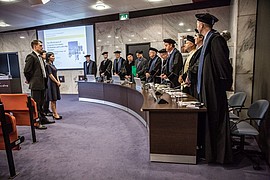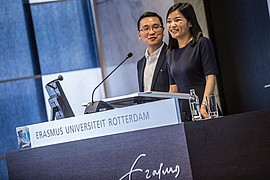PhD Defence: Ying Feng

In her dissertation ‘The Effectiveness of Corporate Governance Mechanisms and Leadership Structure: Impacts on Strategic Change and Firm Performance’, ERIM’s Ying Feng seeks to join the conversation and contribute to corporate governance and strategic management literature by taking a behavioral perspective and investigating the contextual factors.
Ying Feng defended her dissertation in the Senate Hall at Erasmus University Rotterdam on Thursday, 30 March 2017 at 13:30. Her supervisor was Prof. Frans van den Bosch and her co-supervisors were Prof. Henk Volberda and Dr Jatinder Sidhu. Other members of the Doctoral Committee were Prof. Muel Kaptein (Erasmus University Rotterdam), Prof. Arie Lewin (Duke University), Prof. Morten Huse (Universitat Witten/Herdecke), Prof. Hans van Ees (Rijksuniversiteit Groningen), Prof. Erik Maljers (Erasmus University Rotterdam), Prof. Enrico Pennings (Erasmus University Rotterdam), and Prof. Lucas Meijs (Erasmus University Rotterdam)
About Ying Feng

L Ying Feng (born 1987, Jiujiang) did her PhD candidacy at the Department of Strategic Management & Entrepreneurship in Rotterdam School of Management, Erasmus University. Her research interests focus on the strategic decision making of board of directors, top management teams, CEOs, and how their behavioral patterns and characteristics could exert influences on firm-level outcomes, such as financial performance and strategic change. Her work has been increasingly recognized at various prestigious international management conferences, including Academy of Management (AoM), Strategic Management Society (SMS), European Group for Organization Studies (EGOS), and European Academy of Management (EURAM). Her work was also nominated for the Best Conference Paper Prize in SMS 2013. Besides, she has also been invited to present her research papers at many leading universities and institutions across Europe. Ying is now working as an Assistant Professor in ESC Rennes School of Management, France.
Thesis Abstract

How to assess and improve the effectiveness of corporate governance to accommodate the demands of strategic decision making has been one of the top concerns among both scholars and practitioners. While extensive research has taken an economic view when investigating corporate governance mechanisms in previous research, more recently, an increasing number of studies have gradually shifted attention to alternative views to incorporate factors that have been rarely addressed before. This thesis seeks to join the conversation and contribute to corporate governance and strategic management literature by taking a behavioral perspective and investigating the contextual factors through three studies. Study 1 examines the relationship between board gender diversity and firm’s strategic change. Building on Status Characteristics Theory and Role Congruity Theory, the study shows that a gender diverse board may have difficulties in internalizing gender-related resources and utilizing them for firm’s strategic change. It further shows that bringing legitimacy to the presence of female directors is important to facilitate the utilization of resources brought in by female directors. Study 2 takes the Symbolic Management Perspective to explore how the founder CEO succession events could be used as symbolic actions to signify strategic change without substantial changes. It shows that the founder’s retention could largely influence the occurrence of strategic change in the post-succession period, and the impact is affected by post-succession firm performance and founder tenure as CEO. Study 3 investigates the relationship between politically connected independent directors and firm performance in short and long run. By building a Professional-Identity Based View of independent directors, this study shows that independent directors who have different identities derived from respective professions will lead them to exert different influences on firm’s financial outcomes. The three studies together contribute to different but related aspects of corporate governance and strategic management research and add to a better understanding of corporate governance effectiveness in both emerging and developed economies.
Photos: Chris Gorzeman / Capital Images


